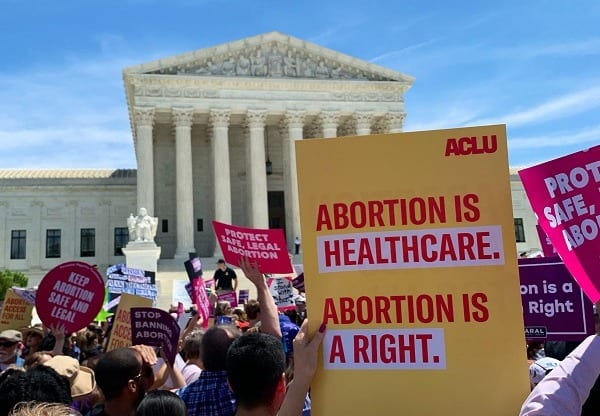It is tangible evidence of the extent to which women are on the periphery of politics and policy in Australia – and we can’t blame it all on the Liberal Nationals well-documented ‘women problem’.
Deputy opposition leader Tanya Plibersek was the most-cited woman politician in the election coverage, coming in twelfth behind some men who aren’t even considered mainstream political figures.
Similarly in the US, despite the historic upward trend of women in government following last year’s midterm elections, women politicians are still the minority, comprising a quarter (or less) of politicians in both houses of Congress.
It should come as no surprise then, that last week in the US, a group of 25 white, male Republican senators voted to pass a bill in Alabama outlawing abortion in all cases, except if a pregnancy threatens the mother’s life.
Earlier this year, US states Georgia, Mississippi, Kentucky and Ohio all passed ‘heartbeat bills’, banning abortion as soon as a foetal heartbeat can be detected, which is as early as six weeks.
Missouri is also following suit, voting to pass a bill that bans abortions at eight weeks.
Arkansas, Tennessee and Kentucky are joining Louisiana, Mississippi, North Dakota and South Dakota in passing ‘trigger laws’ that will immediately enact abortion bans if Roe vs Wade, the legal precedent that constitutionally protects women’s right to abortions, is ever overturned.
Given that abortion rates in the US are declining overall, recent developments might seem out of the blue.
Thanks to the appointment of conservative judges including Brett Kavanaugh – an alleged sexual assaulter – to the US Supreme Court by President Trump, passing bills to effectively end women’s bodily autonomy has become easier.
States are no longer feeling bound by Roe vs Wade, the landmark 1973 case that affirmed ‘access to safe and legal abortion is a constitutional right’.
For the 73 percent of Americans who support Roe vs Wade, however, the decisions by politicians to support bills restricting women’s bodily rights are not representative of the majority’s social attitude.
Alabama’s anti-abortion bill, set to take effect in six months, won’t go unchallenged.
Neither will the bills in Georgia, Kentucky, Ohio, Mississippi or Missouri.
But that’s exactly the plan – because if these legal challenges go all the way to the Supreme Court, their increasingly conservative centre could vote to overturn Roe vs Wade, leaving US states to determine their own laws on abortion.
If these bills make it through the legal challenges and become enshrined in law, women who seek abortions as a result of rape or incest will no longer be granted access. The doctors performing abortions are liable to be sentenced to longer jail terms than rapists.
Outlawing abortion, however, doesn’t stop it occurring, rather it forces women to seek them illegally, endangering their lives.
In Romania, under communist dictator Nicolae Ceaușescu, abortion was outlawed between 1966 and 1990 out of fear of population decline and subsequent labourer shortages. During this time, there was a dramatic increase in abortion mortality, reaching a ‘record-high level of 142 deaths for every 100,000 live births’ at its peak in 1989.
Following the re-legalisation of the procedure, there was a correlated reduction in abortion-related deaths.
In Northern Ireland, part of the UK, abortion has been illegal since 1861, except if a pregnancy gravely threatens the physical or mental health of the mother. Even cases of incest, rape or ‘fatal foetal abnormalities’ do not qualify.
Between 2016 and 2017, just 13 abortions took place there – but over 900 Northern Irish women travelled to England for abortions in 2017 alone.
Draconian laws like these highlight a grave truth: besides being fundamentally sexist, anti-abortion bills are also elitist.
They target low-income earners who experience a lack of access to contraception due to the cost, and who don’t have the means to travel long distances to seek medical treatment elsewhere.
In the US, abortion bans will disproportionately impact women of colour, who are more likely among the poorest people in the states where these laws are being proposed.
In an article published by The Cut, Susan Pace Hill, a law professor at the University of Alabama, addresses the hypocrisy of conservatives who pedal the ‘pro-life’ agenda: “They love to champion themselves as defenders of children by fighting to make abortion illegal, but when it comes to education, health care and other concerns, especially of our most vulnerable children, wealthier Alabamians and the Legislature couldn’t care less.”
This includes Alabama’s woman governor, Kay Ivey, who signed the pro-life bill into law, but has been criticised for shortening the appeals process for criminals on death row.
Today, I signed into law the Alabama Human Life Protection Act. To the bill’s many supporters, this legislation stands as a powerful testament to Alabamians’ deeply held belief that every life is precious & that every life is a sacred gift from God. https://t.co/DwKJyAjSs8 pic.twitter.com/PIUQip6nmw
— Governor Kay Ivey (@GovernorKayIvey) May 15, 2019
The lawmakers and politicians in the US, who are overwhelmingly men, should not have the power to determine the fate of women’s bodily autonomy.
Bodily autonomy is a human right, as enshrined in Article Three of the Universal Declaration of Human Rights. Restricting or banning access to abortions is not only discriminatory, but a violation of our rights: women have a right to seek abortions, and we should not be policing the reasons why.
Tragically, however, the right of women in the US to undergo abortions, currently protected by their constitution, is under greater threat than the right to bear arms, even though there have been 131 mass shootings just this year.
Outlawing abortion flagrantly disregards the systemic barriers to healthcare and family planning disproportionately impacting women of colour and those living in poverty, prioritising a so-called ‘pro-life’ agenda over the profound social injustices experienced by thousands of women.
As Margaret Atwood all too accurately predicted in The Handmaid’s Tale, the future for women is looking increasingly dystopian.


